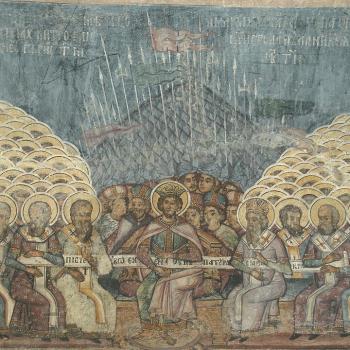The Paschal Shape of the Gospels
In the twenty-first century, we like to think of ourselves as shrewd consumers of news—and even history. We’re skeptical of traditions. We like to think we set a high bar of veracity for evidence. But we have traditions of our own, and among them is the annual proliferation of articles and television specials that claim to disprove the New Testament claims about Jesus. They begin to appear midway through Lent, and they grow numerous during Holy Week. It’s a kind of secular liturgy, with its own proclamations, its own appeals to authority, and its own formative purpose. Among the usual targets is the Passover character of the Last Supper.
One such headline, just a few years ago, asked, “The Last Supper—A Passover Seder?”[1] A procession of skeptical experts was summoned to testify before the author came to a predictably negative conclusion.
This is not news, and it’s not new. It was a pattern already established, in academia and in media, in those long-ago years when I was a pastor. In 1984 a Jewish scholar named Baruch Bokser summarized the recent research and concluded: “The current state of scholarship tends to argue against the identification of the Last Supper as a seder.”[2]
The New Testament authors, however, did not seem to harbor any doubt. The Gospel According to Mark—which is often tagged by skeptics as the earliest and most reliable of the Gospels—is unambiguous in its testimony. The evangelist states plainly that the Last Supper takes place “on the first day of Unleavened Bread, when they sacrificed the Passover lamb” (Mark 14:12). The disciples say they are going to “prepare . . . to eat the Passover” (ibid.). Jesus himself describes the action in the same terms: “I am to eat the Passover with my disciples” (Mark 14:14). And, if that were not clear enough, the evangelist goes on to tell us, “the disciples set out and went to the city . . . and they prepared the Passover” (Mark 14:16). In five verses, Mark date-stamps the event four times.
The first three Gospels, in fact, present the Last Supper in strikingly similar ways. They tend to track closely in their presentation of all the events in Jesus’ ministry. This is why scholars refer to Matthew, Mark, and Luke as the “Synoptic Gospels”—from a Greek word that means “seeing together.” When they differ, it is usually because one evangelist is including details that the others omitted. Thus, for example, only Luke mentions that Jesus told his disciples: “I have earnestly desired to eat this Passover with you before I suffer” (Luke 22:15). Only Matthew tells us that, in the days before the Last Supper, Jesus made this rather specific prediction: “after two days the Passover is coming, and the Son of man will be delivered up to be crucified” (Matthew 26:2).
They differ in the specifics they choose to bring to the foreground, but all three of the Synoptics agree that the Last Supper was a Passover meal.
So what’s the problem?
Well, the critics identify several problems.
The first is that the narratives fail to mention several of the menu items necessary for the seder. We search in vain for any word of bitter herbs or the sacrificial lamb. If those items were absent—and if Jesus did not speak of them—then the Last Supper failed two of Rabban Gamaliel’s three requirements for a valid Passover.
Critics also note that the disciples never pose the scripted questions to their Master, and the Master never tells the story of the Exodus. These details are indeed absent from the narratives, but that hardly means they were missing from the event. The Gospels, in fact, never give us exhaustive reportage. Luke, for example, offers very few particulars in the story of Mary’s purification and Jesus’ presentation (see Luke 2:22–24). In a similar way, he provides little in the way of liturgical context when he tells of Jesus’ teaching in the synagogue (Luke 4:16–27).
The Gospel narratives, especially in the Synoptics, are spare, light on detail. The evangelists assume that their readers have at least a glancing familiarity with Jewish customs. Thus, they assume that the Passover and the seder—like the synagogue liturgy and the ritual of purification—need not be explained.




